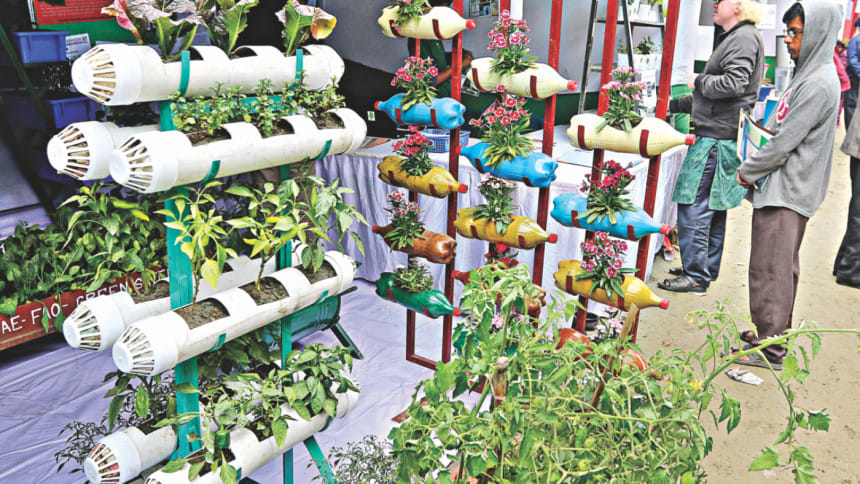Boom in Veg Farming: Middlemen mint money

In recent years, the growth in vegetable production in Bangladesh has been the third fastest in the world according to data from the United Nations Food and Agricultural Organisation (FAO). The country now grows 3.7 million MT of vegetables a year from less than a tenth of Bangladesh's available cultivable land.
Owing to rising public awareness about healthy, fibrous food, demand for vegetables is on the rise too. It's also all the more heartening that growers are using less chemical pesticides than before, again, as a result of years of awareness campaigns.
However, consumers are yet to benefit from the rise in production. High production of vegetables has yet to translate into low cost for the consumers.
Lack of value chain, rent seeking, profit-mongering by politically-linked year-on-year increment in vegetable production after Uzbekistan and Nepal during the first decade of the 21st century.
According to the Ministry of Agriculture and Department of Agricultural Extension, some 156 types of local and exotic vegetables were grown in Bangladesh with the output hitting 3.73 million metric tonnes from 0.8 million hectares of land in the last fiscal year.
The demand for vegetables in the country is 13.25 million metric tonnes.
“So to meet the demand of consumers, the production should be increased three times or more,” said Dr Md Harunur Rashid, vice-chancellor of Patuakhali Science and Technology University.
Vegetable production in Bangladesh has increased more than five times since the independence and doubled in just over a decade. This has resulted in the country becoming one of the fastest-growing vegetable producers in the world, Mizanur Rahman, director of Horticulture Wing of Department of Agricultural Extension, told The Daily Star.
“Although the land [used] for vegetable production is not increasing every year, the production itself is increasing annually because farmers' are adopting hybrid seeds, doing home gardening and cultivating off-season and all-season vegetables,” he said.
He also said that the high profit margins have also encouraged farmers to cultivate more vegetables rather than rice and wheat.
Mizanur said production is increasing every year because of the introduction of new technology and better quality seeds.
He said that quality seed is essential for ensuring quality vegetable production and suggested that climate-resilient and salinity-tolerant seeds should be invented.
Returning to the positives, Mizanur touched upon the decrease in the use of chemicals.
“The usage of chemical pesticide has decreased around 29 percent from 2009 to 2017. This is because of the introduction of pheromone technology and bio-chemical pesticides. Currently, there are 18 registered biochemical products available in the market and eight new products in the pipeline,” Dr Syed Nurul Alam, chief scientific officer, Entomology division, Bangladesh Agriculture Research Institute, said.
PRICE STILL HIGH
Stakeholders said unusual and excessive rain, rise in transport and labour cost and middlemen's profit are all to blame for the high price of vegetables throughout the year.
While vegetable prices normally fall during winter, it was not the case this year.
Although the government said the production of vegetables will not fall this year, farmers and experts disagreed.
Bailey Begum, a farmer in Ishwardi of Pabna, told The Daily Star that production cost has gone up by 25-30 percent this year compared to last year and production has fallen.
“Last year, I cultivated around 40 bighas of land but this year I used only five bighas due to excessive and unusual rain. We also cannot collect vegetable from the field due to dense fog. Last year, I sold cauliflowers for Tk. 80-100 per maund but this year the price is Tk. 600-700. We are happy as we are getting a good price.”
Officials said the high price of vegetables is not always bad if the growers reap the benefits because it will encourage them to produce more.
Mehedi Hasan, another farmer from Shahpur of Pabna, said transportation and labour cost have gone up this year which triggered the price hike of vegetables.
Abdur Rashid said when supply is hampered the price of vegetables will increase as it is a perishable item.
“Unlike other countries with large swathes of land, Bangladesh has small parcels of land per farmer. Thus, they cannot afford to take their vegetables to the market directly as it is not feasible,” he said.
He explained that this is why they rely on middlemen to sell their produce. They cannot store them as the facilities are not available and so have to be sold soon after harvest.
There is syndicate of middleman and they take advantage when there is a gap between demand and supply, he alleged.
He, however, pointed out that while the middlemen do play a role in increasing prices, they earn maybe 2-3% from the total cost.
“Excessive rain, late sowing and harvesting of vegetables are the reasons for high prices this year. There was a lot of fog and that's why farmers could not harvest vegetables on time and could not transport them to the cities from the field. So these are the reasons [leading to an increase in] the price of vegetable.
“One thing we should keep in mind is that better prices will encourage growers to produce more vegetable…,” he said.

 For all latest news, follow The Daily Star's Google News channel.
For all latest news, follow The Daily Star's Google News channel. 



Comments